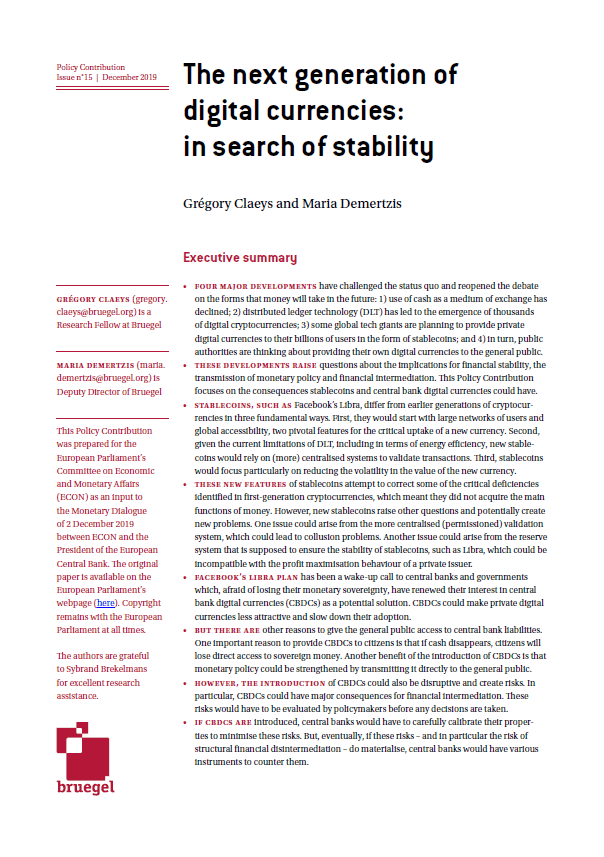Policy Contribution
The next generation of digital currencies: in search of stability
Recent developments have re-opened the debate on the future of money. This Policy Contribution discusses two aspects: the implications of the rise of global private stablecoins, such as Facebook's Libra, and the role that public central bank digital currencies could play.
This Policy Contribution was prepared for the European Parliament’s Committee on Economic and Monetary Affairs (ECON) as an input to the Monetary Dialogue of 2 December 2019 between ECON and the President of the European Central Bank. The original paper is available on the European Parliament’s webpage (here). Copyright remains with the European Parliament at all times.
Four major developments have challenged the status quo and reopened the debate on the forms that money will take in the future: 1) use of cash as a medium of exchange has declined; 2) distributed ledger technology (DLT) has led to the emergence of thousands of digital cryptocurrencies; 3) some global tech giants are planning to provide private digital currencies to their billions of users in the form of stablecoins; and 4) in turn, public authorities are thinking about providing their own digital currencies to the general public.
These developments raise questions about the implications for financial stability, the transmission of monetary policy and financial intermediation. This Policy Contribution focuses on the consequences stablecoins and central bank digital currencies could have.
Stablecoins, such as Facebook’s Libra, differ from earlier generations of cryptocurrencies in three fundamental ways. First, they would start with large networks of users and global accessibility, two pivotal features for the critical uptake of a new currency. Second, given the current limitations of DLT, including in terms of energy efficiency, new stablecoins would rely on (more) centralised systems to validate transactions. Third, stablecoins would focus particularly on reducing the volatility in the value of the new currency.
These new features of stablecoins attempt to correct some of the critical deficiencies identified in first-generation cryptocurrencies, which meant they did not acquire the main functions of money. However, new stablecoins raise other questions and potentially create new problems. One issue could arise from the more centralised (permissioned) validation system, which could lead to collusion problems. Another issue could arise from the reserve system that is supposed to ensure the stability of stablecoins, such as Libra, which could be incompatible with the profit maximisation behaviour of a private issuer.
Facebook’s Libra plan has been a wake-up call to central banks and governments which, afraid of losing their monetary sovereignty, have renewed their interest in central bank digital currencies (CBDCs) as a potential solution. CBDCs could make private digital currencies less attractive and slow down their adoption.
But there are other reasons to give the general public access to central bank liabilities. One important reason to provide CBDCs to citizens is that if cash disappears, citizens will lose direct access to sovereign money. Another benefit of the introduction of CBDCs is that monetary policy could be strengthened by transmitting it directly to the general public.
However, the introduction of CBDCs could also be disruptive and create risks. In particular, CBDCs could have major consequences for financial intermediation. These risks would have to be evaluated by policymakers before any decisions are taken.
If CBDCs are introduced, central banks would have to carefully calibrate their properties to minimise these risks. But, eventually, if these risks – and in particular the risk of structural financial disintermediation – do materialise, central banks would have various instruments to counter them.




